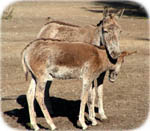The final months
The end of Jesus' ministry was marked with a triumphal entry into Jerusalem and great antagonism from local religious leaders.
The triumphal entry into Jerusalem
(see Matthew 21:1-11)
 About 500 years before the time of Jesus, there was a prophet of God named Zechariah (see Zechariah 9:9) who spoke of a king presenting himself to Jerusalem while riding on a humble donkey. This is how Jesus entered the Holy City of Jerusalem shortly before he was crucified and killed. He rode on the back of a donkey into the city. Along the way, a crowd of people gathered near Him, praising him as he went by.
About 500 years before the time of Jesus, there was a prophet of God named Zechariah (see Zechariah 9:9) who spoke of a king presenting himself to Jerusalem while riding on a humble donkey. This is how Jesus entered the Holy City of Jerusalem shortly before he was crucified and killed. He rode on the back of a donkey into the city. Along the way, a crowd of people gathered near Him, praising him as he went by.
The question about paying taxes
(see Matthew 22:15-22)
The religious and political groups of Jerusalem, such as the Pharisees and Sadducees, were often at odds with Jesus. Members of these groups conspired to get rid of Jesus. In Matthew 22, the Pharisees tried to trap Jesus by asking whether Jews should pay taxes to the Romans:
Then the Pharisees went out and laid plans to trap him in his words. They sent their disciples to him along with the Herodians. "Teacher," they said, "we know you are a man of integrity and that you teach the way of God in accordance with the truth. You aren't swayed by men, because you pay no attention to who they are. Tell us then, what is your opinion? Is it right to pay taxes to Caesar or not?"
But Jesus, knowing their evil intent, said, "You hypocrites, why are you trying to trap me? Show me the coin used for paying the tax." They brought him a denarius, and he asked them, "Whose portrait is this? And whose inscription?"
"Caesar's," they replied.
Then he said to them, "Give to Caesar what is Caesar's, and to God what is God's."
When they heard this, they were amazed. So they left him and went away. (Matthew 22:15-22 NIV).
The authority of Jesus
(see Matthew 21:23-27)
The opponents of Jesus had to be careful in trying to silence him. They knew that Jesus was popular, so they tried to find ways to trap him without angering the people. In this example from the book of Matthew, the opponents came up with a ploy that backfired:
Jesus entered the temple courts, and, while he was teaching, the chief priests and the elders of the people came to him. "By what authority are you doing these things?" they asked. "And who gave you this authority?"
Jesus replied, "I will also ask you one question. If you answer me, I will tell you by what authority I am doing these things. John's baptism-where did it come from? Was it from heaven, or from men?"
They discussed it among themselves and said, "If we say, 'From heaven,' he will ask, 'Then why didn't you believe him?' But if we say, 'From men'-we are afraid of the people, for they all hold that John was a prophet." So they answered Jesus, "We don't know."
Then he said, "Neither will I tell you by what authority I am doing these things. (Matthew 21:23-27 NIV)
The widow's offering
(see Mark 12:41-44)
While Jesus was at the Temple, people were making contributions to the Temple treasury:
Jesus sat down opposite the place where the offerings were put and watched the crowd putting their money into the temple treasury. Many rich people threw in large amounts.
But a poor widow came and put in two very small copper coins, worth only a fraction of a penny. Calling his disciples to him, Jesus said, "I tell you the truth, this poor widow has put more into the treasury than all the others. They all gave out of their wealth; but she, out of her poverty, put in everything--all she had to live on." (Mark 12:41-44 NIV)
The great commandment (the Golden Rule)
(see Matthew 22:34-40)
The book of Matthew shows another example of how some of Jerusalem's religious leaders tried to test Jesus:
Hearing that Jesus had silenced the Sadducees, the Pharisees got together. One of them, an expert in the law, tested him with this question:
"Teacher, which is the greatest commandment in the Law?"
Jesus replied: " 'Love the Lord your God with all your heart and with all your soul and with all your mind.' This is the first and greatest commandment. And the second is like it: 'Love your neighbor as yourself.' All the Law and the Prophets hang on these two commandments." (Matthew 22:34-40 NIV)
Jesus was able to summarize the Law, which is the first five books of the Old Testament, into a few sentences.